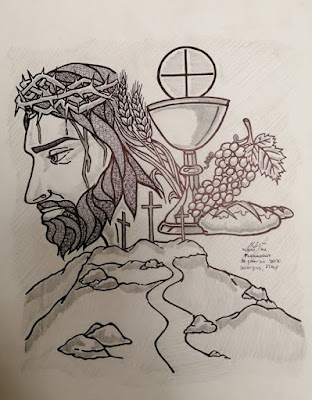EUCHARIST, AN EXCHANGE OF LOVE.
April 09 2020 - Holy Thursday - Lord's Supper
A Danish proverb says, “He who would buy sausage of a dog must
give him bacon in exchange.” And a Hawaiian proverb adds, “When love is given,
love should be returned.”
There is an Ivorian Eucharistic hymn that could nicely open
us to today’s celebration, the feast of the institution of the Holy Eucharist.
The song goes this way, “O, what admirable exchange, God gives himself to us.
God for us made himself bread and wine, to dwell in us! O, what a beautiful
mystery, wonderful love. It is the Creator, who unites with his creature.”
Here is the heart of tonight’s celebration. God becomes
bread and wine and finds his dwelling in man’s heart, in our souls. In the Holy
Eucharist, God, not only becomes our food but moreover, he becomes our friend
and companion of life. God in the Holy Eucharist calls us to participate in the
most sacred supper of his only begotten Son for us to be strong enough to
participate in his passion. What we celebrate with great joy tonight on this
Holy Altar is an anticipation of what will take place tomorrow on the other
Altar of the Cross.
The sacrament of the Eucharist is par excellence, a
sacrament of love. In this sacrament, we realize truly what St. John affirmed:
“We love because he first loved us” (1 Jn 4:19). The Eucharist, therefore, is a
call for an exchange of love.
To help us celebrate that love which saves us from the
dominion of sin, the first reading plunges us in a page of history, the celebration
of the Passover of the Lord by the children of Israel. It comes out clear to
the Israelites that the Passover is a festival for all generations, and
forever. The Eucharist is here foreshadowed as the food for the journey, the
bread of the road. The children of Israel, in captivity in Egypt, were called
to eat the flesh of roasted meat and apply its blood on “the two doorposts and
the lintel of every house in which they partake of the lamb.” The Lord God,
through that blood, will save them from the punishment he was to inflict to the
land of Egypt.
The Psalmist leads us to raise the voice in thanksgiving to
the Lord for all his goodness to us. The Eucharist, here becomes a thanksgiving
offering, a praise to God. And we feel through it that, the only thing we can
do to praise the Lord, is to raise a cup of salvation and call upon his name.
That is rightly what we do at every Eucharistic celebration.
Speaking of a cup of salvation, and of blood pour out for
our salvation, St. Paul, in the second reading narrates the memorial of the
institution of the Holy Eucharist, the Lord’s Supper. Paul put a very special
emphasis on the divine order, “Do this in remembrance of me.” Thus, he affirms
that, “as often as you eat this bread and drink the cup, you proclaim the death
of the Lord until he comes.” These are words we pronounce at every celebration
of the Mass when we say the consecration prayer and sing the anamnesis.
The Gospel of John brings us back to the very evening where
the Lord Jesus instituted the Holy Eucharist. It presents another beautiful
dimension of the Eucharist as “sacrament of service”. The Lord, before giving
himself to his disciples as bread and wine, made himself their servant. He has washed
their feet. The Eucharist is here seen as a sacrament of humility and love.
Jesus, washing his disciples’ feet, teaches us about the perfection of love.
Love is well expressed when it can lower itself to serve.
In tonight’s celebration, we are taught about love,
humility, and service. The love of Jesus for his disciples led him to humble
himself and serve them. After that, he gave them this mandate, “If I,
therefore, the master and teacher, have washed your feet, you ought to wash one
another’s feet. I have given you a model to follow so that as I have done for
you, you should also do.” As Christ-followers, we must copy-paste (that is to always
actualize) this quite simple, yet, deep gesture of Jesus; humble ourselves out
of love and serve each other. The Eucharist is an exchange of love to be
continued, from Jesus to us and from us to others, “until he comes again”.
May our Eucharistic celebration, not be only
simple ritualism to which we take part without any impact on our daily being.
At mass, you receive Jesus’ love to give love to your brothers and sisters.
Jesus gives himself to you under the bread and wine so that you might also give
yourself to your fellow. The exchange becomes effective when you are ready to
give back to others. Do never keep the love you receive for yourself. Love is
to be given, and not to be kept. And this Ivorian proverb to finish, “Love is
like cough you can't hold it back.”





Comments
Post a Comment